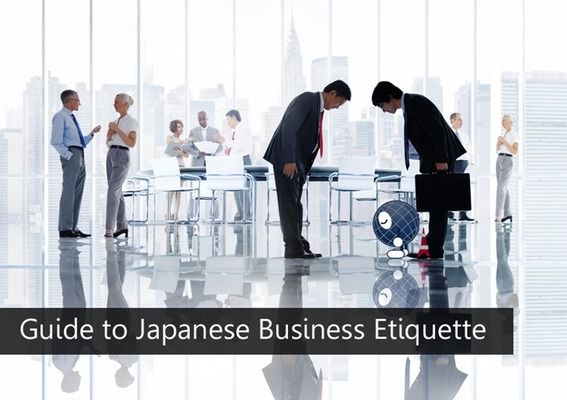
Introduction
Japan is a nation known for its rich culture, history, and traditions, and this extends to its business practices as well. Understanding and respecting Japanese business etiquette is essential for any individual or company looking to establish successful business relationships in Japan. This guide aims to provide a comprehensive overview of the key elements of Japanese business etiquette, from greetings and communication to gift-giving and dining customs.
1. Bowing - The Art of Non-Verbal Communication
In Japan, bowing is a common form of greeting and showing respect. The depth and length of the bow convey the level of respect or formality. A slight nod is appropriate for casual situations, while a deeper bow is used for more formal occasions, especially when meeting with senior executives or clients. When returning a bow, it is essential to match the depth of the other person's bow.
2. Exchanging Business Cards - Meishi (名刺) Exchange
Exchanging business cards is a crucial part of Japanese business culture. The process of giving and receiving business cards should be done with respect and formality. Present your card with both hands, making sure the text faces the recipient. When receiving a card, take a moment to read it and show appreciation. Never write on a business card or put it away immediately, as this is considered disrespectful.
3. Communication Style - Tatemae (建前) and Honne (本音)
Japanese communication often involves two aspects: tatemae (what is shown in public) and honne (true feelings or intentions). It is common for Japanese professionals to maintain harmony and avoid direct confrontation, leading to subtle expressions of disagreement. As a foreign businessperson, it is essential to be attentive to non-verbal cues and read between the lines to understand the true message being conveyed.
4. Language and Courtesy - Using Polite Forms
Politeness and courteous language are highly valued in Japanese society. The use of honorifics, such as "-san" after a person's name, is customary to show respect. Additionally, using polite phrases like "arigatou gozaimasu" (thank you) and "sumimasen" (excuse me) demonstrate good manners and will be greatly appreciated.
5. Dress Code - Formality and Conservatism
Japanese business attire is typically conservative and formal. Dark-colored suits are the norm for both men and women. Avoid wearing flashy or revealing clothing, as modesty is highly valued in Japanese culture. It is better to be slightly overdressed than underdressed for business meetings.
6. Punctuality - Being on Time Matters
Punctuality is a sign of respect in Japan. Arriving on time for meetings and appointments is crucial, as lateness may be seen as disrespectful and could harm your business relationship. If you are running late, be sure to inform the other party as soon as possible and apologize sincerely.
7. Gift-Giving - A Gesture of Appreciation
Gift-giving is deeply ingrained in Japanese culture, and it plays an essential role in business relationships. When presenting a gift, wrap it elegantly and offer it with both hands as a sign of respect. Be mindful of the symbolism associated with certain gifts, such as avoiding items in sets of four, as the number is associated with death.
8. Business Entertaining - The Art of Navigating Social Situations
Japanese business entertaining often involves socializing over meals or drinks. If you are invited to a business dinner or gathering, show appreciation for the invitation and be respectful during the event. Observe and follow the lead of your hosts when it comes to seating arrangements, ordering food, and drinking alcohol. Avoid becoming excessively intoxicated, as this is considered unprofessional behavior.
9. Group Harmony - Wa (和) in Decision-Making
Japanese business culture places a strong emphasis on group harmony, known as "wa." Decisions are often made collectively, and it is essential to be patient during discussions and avoid imposing your views forcefully. Demonstrate a willingness to collaborate and find solutions that benefit everyone involved.
10. Follow-Up and Thank-You Notes - Show Your Appreciation
After a business meeting or event, it is customary to send a thank-you note expressing your gratitude for the opportunity to meet and collaborate. This gesture of appreciation will leave a positive impression and help strengthen the business relationship.
Conclusion
Japanese business etiquette is a reflection of the country's deep-rooted cultural values of respect, humility, and harmony. By understanding and adhering to these customs, you can establish strong and successful business relationships in Japan. Remember to approach interactions with an open mind, be patient, and be willing to adapt to the local customs and traditions. Embracing Japanese business etiquette will not only facilitate smoother business dealings but also demonstrate your sincerity and commitment to building meaningful partnerships.





